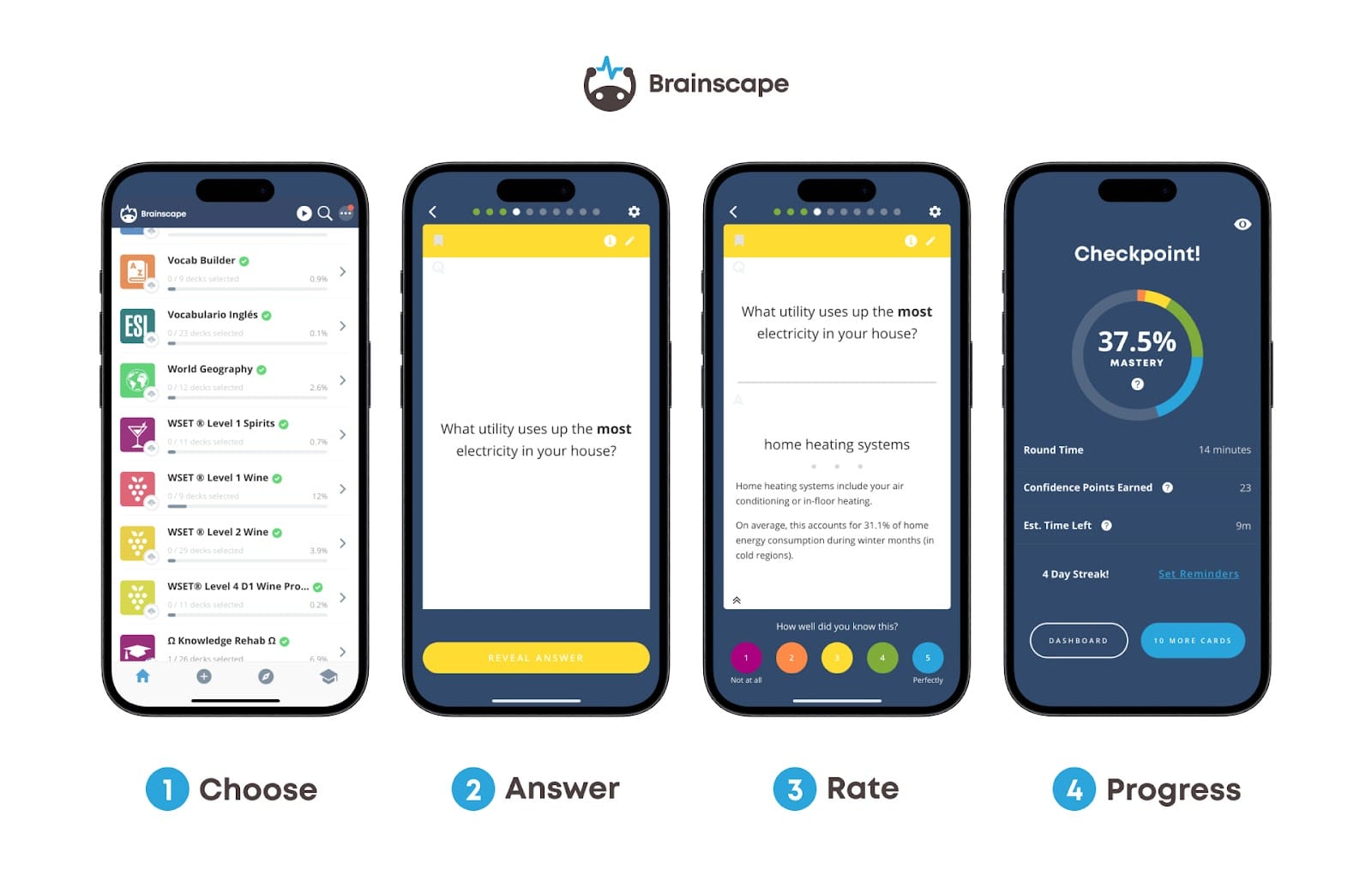Music for studying has evolved over time from a preference into an entire genre. From lo-fi study beats YouTube channels to collections of Mozart for babies-to-be, there are plenty of people who will tell you that music, especially classical music, stimulates brain activity and learning.
But does music help you study―for real?
If you were going purely off public opinion and collective wisdom, you might believe that each concerto you listen to bumps your IQ up by 5. Unfortunately, these music-based mental gains may not only be nonexistent but, in certain cases, your study music may be actively working AGAINST you.
This isn’t coming from a place of opinion, either, but fact. While building Brainscape, our very best geeks combed through decades of academic journals and research to build the most scientifically optimized study app possible.
As a pleasant side effect of all that research, we’re also qualified to cover the series of events that led pregnant women to strap headphones to their baby bump in search of a prenatal IQ boost.
We've gathered all our research in this article to answer the most-asked questions about music and study:
- Does classical music improve mental performance?
- Does listening to music while studying have negative effects?
- How can Brainscape help you study more effectively (than with music, anyway!)?
- Should I just study in silence? Because that sucks.
- What about using music to work or brainstorm?
1. Does Classical Music Improve Mental Performance?
The belief that classical music boosts mental performance seems to originate from a 1993 study in Nature titled “Music and Spatial Task Performance.” Before we even finish reading the title, we start to see some of the flaws in the theory.
The study in question was based on tasks specifically related to spatial reasoning—the capacity to understand, reason, and remember the spatial relations among objects or space. This may come in handy for beating your Tetris high score or rearranging your lounge in a way that would make Mary Kondo proud.
But jumping over a knowledge-heavy hurdle such as the bar exam? Not so much.
This study on music and spatial reasoning was picked up by the New York Times, which reported on it, losing a bit of specificity in the process. Then, through a game of broken telephone, we ended up with the heavily simplified conviction that “classical music makes you smarter.”
From spatial reasoning to IQ. That’s a bit of a leap, isn’t it? Unfortunately, students and parents everywhere have been repeating it ever since.
2. Does Listening to Music While Studying Have Negative Effects?
Sorry to Wolfgang, but it just might. According to a 2010 study from the University of Wales in Cardiff, listening to music while attempting to memorize information may actually hinder your efforts:
“The poorer performance of the music and changing-state sounds are due to the acoustical variation within those environments. This impairs the ability to recall the order of items, via rehearsal, within the presented list. Mental arithmetic also requires the ability to retain order information in the short-term via rehearsal, and may be similarly affected by their performance in the presence of changing-state, background environments.”
The authors speculated that “music may impair cognitive abilities in these scenarios because if you’re trying to memorize things in order, you may get thrown off by the changing words and notes in your chosen song.”
In layman’s terms, when studying your biology notes, you might not remember the parts of the limbic system quite as well if your brain is (unconsciously) trying to keep up with Kendrick.
This could be a disaster for students trying to prepare for important exams.
3. How Can Brainscape Help You Study More Effectively (Than With Music, Anyway!)?
Another thing that may help you focus on your studies? Using the Brainscape app. One of the reasons students like studying with music in the background is because they find studying to be, well, boring. The music makes the experience more pleasurable. However, as we’ve seen, it doesn’t do you any cognitive favors.
Brainscape’s adaptive flashcard system is built from the ground up around methods like spaced repetition and active recall to make studying easier and more effective. Moreover, the information is delivered in super manageable bite-sizes with a cornucopia of features designed to grip your attention and keep you engaged while preparing for your exam.

So, while there’s no magical pill or a single tip that’ll make you learn better, Brainscape can swing the needle in the right direction.
4. Should I Just Study in Silence? Because That Sucks.
Not necessarily! There are some options if total quiet is a little too eerie for you. Since changing-state conditions (like music) impair recall, we can assume that quiet, repetitive music is not as harmful to recall as more complex music. If you MUST listen to music while studying, quiet, repetitive instrumental music seems to be the safest option (you win this round, lo-fi girl.)
Other repetitive, non-distracting options include white noise, brown noise, and binaural beats for focus.
5. What About Using Music to Work or Brainstorm?
We’ve been discussing the effects that music has on studying and memorization. But that’s not to say music can’t positively affect your work and mind in other ways and for other types of tasks. In fact, there’s evidence that music can boost the quality and quantity of your performance in these other tasks.
A study from the University of Windsor found that when it came to software development, developers produced both a greater quantity and higher quality of work when they had background music.
What if you’re working in a creative space, trying to come up with a new world-changing idea or maybe the perfect joke for your blog post? Well, music can help there as well. In 2012, a study from the Journal of Consumer Research discovered that not only music but even just moderately loud ambient noise improved subjects’ abstract thinking, boosting their creativity and effectiveness.
Trying to learn a new language? It turns out that if you’re a musician, you may already have a leg up on the competition.
Overall, it would appear that music can improve our creative prowess. But the same doesn’t apply to sitting down to master a knowledge-heavy subject. That’s when Brainscape can really come in handy.
FAQ: Does Music Really Help You Study Better?
Does music really help with studying?
It depends on the type of studying you're doing. While music may help with mood and motivation, especially during repetitive or creative tasks, it's less effective for tasks that require memorization or complex cognitive processing. In those cases, silence or non-distracting background noise tends to yield better results.
Is it better to study in silence or with music?
For most people, silence or ambient, non-lyrical sounds are best when studying information-intensive subjects. Music with lyrics or varying tempos can compete with your brain’s working memory, making it harder to concentrate or recall facts.
Is it better to focus with or without music?
When the goal is deep focus, like absorbing dense material, solving problems, or reviewing flashcards, most research supports working without music or using something neutral like white noise. For brainstorming or repetitive tasks, however, music might be beneficial.
Is it better to revise with or without music?
During revision, especially when trying to consolidate memory, a quiet environment typically supports stronger recall. If you prefer some audio, choose simple instrumental tracks or ambient soundscapes that don’t demand your attention.
So Do I Hit Play or Pause Come Study Time?
While music might help you get into the vibe of studying, science says it’s not exactly helping you retain that tricky vocab list or ace your anatomy flashcards. In fact, it could be quietly sabotaging your short-term memory.
That doesn’t mean you need to ban music altogether—but when it’s crunch time, your best bet is still focused, structured study.
Luckily, Brainscape is here to make focused study way more effective and way less boring. With our adaptive flashcard system built around spaced repetition and active recall, you’ll stay engaged, efficient, and always in tune with your progress (pun intended).

Save the lo-fi beats for your creative brainstorms and let Brainscape handle the heavy lifting when it comes to learning. Your future exam-crushing self will thank you.
Additional Reading
Sources
Ettlinger, M., Margulis, E., & Wong, P. (2011). Implicit memory in music and language. Frontiers in Psychology. https://books.google.com/books?id=-L-tlIXA8WQC&lpg=PA99
Kraus, N., & Chandrasekaran, B. (2010). Music training for the development of auditory skills. Nature Reviews Neuroscience, 11(8), 599-605. https://doi.org/10.1038/nrn2882
Lesiuk, T. (2005). The effect of music listening on work performance. Psychology of Music, 33(2), 173-191. https://journals.sagepub.com/doi/10.1177/0305735605050650
Mehta, R., Zhu, R., & Cheema, A. (2012, December). Is noise always bad? Exploring the effects of ambient noise on creative cognition. Journal of Consumer Research, 39(4), 784-799. https://www.jstor.org/stable/10.1086/665048
Perham, N., & Vizard, J. (2011). Can preference for background music mediate the irrelevant sound effect? Applied Cognitive Psychology, 25(4), 625-631. https://doi.org/10.1002/acp.1731
Rauscher, F., Shaw, G. & Ky, C. (1993, October 14). Music and spatial task performance. Nature, 365, 611. https://doi.org/10.1038/365611a0
